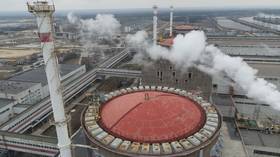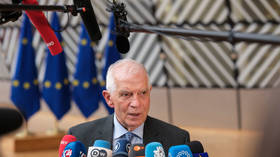Ukraine is using this simple trick to hurt the EU
Strikes on the Zaporozhye nuclear power plant are being leveraged to push for sanctions that could impact Western Europe
Ukraine says that in the wake of recent unattributed drone attacks on the Zaporozhye nuclear power plant, Moscow just has to give it back. Not that Kiev had anything to do with it, of course. No doubt it was just the Ghost of Kiev and the Heroes of Snake Island making a comeback after spending some downtime consulting with Hollywood on some new superhero franchises.
Russia expressed concerns that Ukraine was attacking the plant again in a series of incidents over the past week. In denying it, Kiev issued a statement addressing ”recent Russian provocations at the Zaporizhzhia nuclear power plant” – but then dodged the issue of the attacks themselves. “The only source of threats [to the nuclear powerplant] has been and remains the illegal and criminal actions of the Russian invaders,” it said.
“We once again insist that [the nuclear power plant] be returned under the control of its rightful owner, Ukraine, and Russia be held accountable for all its crimes.” So you’re implying that Russia wants to blow up a nuclear powerplant it controls, and that if it gives the power plant back, it will suddenly stop wanting to blow it up? Because that makes logical sense.
In its statement, the Ministry of Foreign Affairs of Ukraine refers to vague nuclear safety threats “created by Russia,” but it buried the lede in calling on its “partners” to sanction Russia’s atomic energy sector near the very bottom of the press release.
How convenient. It just so happens that the Russian atomic energy sector is virtually sanctions-proof. Even while French President Emmanuel Macron was talking recently about sending troops to fight Russia, there’s a joint innovation venture underway between French and Russian engineers from the state atomic energy corporations Rosatom and Framatome. The head of the global atomic energy agency has even warned against doing anything stupid sanctions-wise against Russia in the nuclear power sector. “I would warn against this point of good nuclear energy against bad nuclear energy,” International Atomic Energy Agency Director General Rafael Mariano Grossi told an atomic energy summit last month. “I don’t think this is what we need to have in the global energy market.”
Germany isn’t happy about France and Russia working together on nuclear energy, according to Bloomberg. Prior to the Ukraine conflict, Berlin had been fighting against cheap French nuclear energy at the EU level in order to make the French economy less competitive, or at least improve its own prospects after it went “all in” on green energy. This was clearly shown to be not ready for prime time after Germany shrugged off Nord Stream being blown up along with its cheap supply of Russian gas. Now the US is seducing German green industry with promises of plentiful gas and tax breaks under Biden’s Inflation Reduction Act. At the same time, Germany is now importing Russian-partnered French nuclear energy, which it has long sought to compromise under the pretext that it’s bad for the planet, all while resorting to firing its own coal plants back up.
So Berlin doesn’t sound like the best advisor on energy strategy. France, however, at least had a modicum of self-preservation kick in before it was too late, with Macron doing a 180-degree turn (or 360 degrees if you’re the German foreign minister, Annalena Baerbock) and revving its own decommissioned nuclear power plants back up when it realized that Nord Stream was dead. But Kiev’s latest statement demanding sanctions against Russia’s nuclear sector suggests that it’s pressuring Paris to abandon whatever’s left of its senses.
If anyone wasn’t aware that Russian nuclear energy was an obsession of Kiev’s, consider that its intelligence service (the SBU) has also just detained six design engineers in Kharkov accused of cooperating with Rosatom, via a contractor, in allegedly plotting to integrate the Zaporozhye power plant into the Russian nuclear network, according to the SBU’s own press service.
Despite these details, Kiev’s Western sponsors seem keen to play up the aura of “uncertainty” around the Zaporozhye powerplant drone attacks to try to convince Russia to take a hike. “Russia is playing a very dangerous game with its military seizure of Ukraine’s nuclear power plant,” State Department spokesman Matthew Miller said. Well then maybe just tell your Ukrainian buddies to knock it off, then? Or is the US lumbering up to blame any potential future nuclear disaster on one of the so-called “pro-Ukrainian groups” – the kind that unidentified US officials have conveniently accused, via Western press leaks, of taking out Nord Stream?
“Reckless drone attack against Zaporizhzhia nuclear power plant increases risk of dangerous nuclear accident. Such attacks must stop…Russia should withdraw from Zaporizhzhia nuclear power plant,” Tweeted EU chief diplomat Josep Borrell. Yeah, it totally doesn’t sound like you guys all share talking points or anything.
What’s glaring is that none of Kiev’s Western enablers are actually arguing that Russia attacked its own asset with drones, on territory that it controls. Guess that would sound just a bit too stupid. Instead, they’re implying that Russia’s presence could end up justifying a nuclear disaster. Which is super smart!
But by playing along with Kiev’s Russian blame game like indulgent parents of an unruly toddler, the Western establishment figureheads may be failing to realize how Kiev’s targeting of Russia’s nuclear industry could, yet again, result in them talking themselves into harming their own critical interests “for Ukraine.” Not that it would be more important than the nuclear fallout, which sounds like it could easily be prevented with a spanking, a time-out, and the withholding of entitlements.
The statements, views and opinions expressed in this column are solely those of the author and do not necessarily represent those of RT.







Comments are closed.